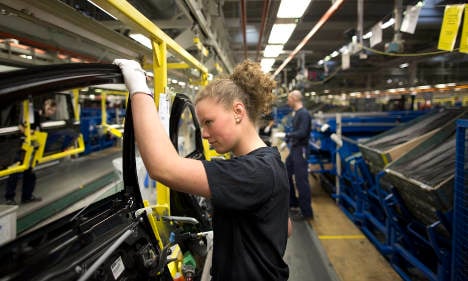BUSINESS
Night owls nab jobs at Sweden’s Volvo Cars
Volvo Cars has reintroduced night shifts at its plant in Torslanda in west Sweden, creating an extra 1,500 jobs in the company's home region.
Published: 4 May 2015 16:25 CEST

Volvo shift worker Sandra Hellgren. Photo: Björn Larsson Rosvall / TT
The first night shifts since 2008 got underway on Monday, having previously been scrapped as the firm shed staff while it weathered the financial crisis.
Sweden's most famous car company has changed its rota deal with production of its all new XC90 seven-seater SUV, for which it has already received close to 30,000 pre-orders. Workers will now follow a three shift pattern.
Volvo initially said that it would take on 1,300 new recruits but upped its recruitment by 200 thanks to an increase in line speed at the plant. 48 to 50 cars are now produced every hour.
The hiring move brings Volvo Cars' total employee count to 17,300 of which 13,500 are in Torslanda, close to Gothenburg.
“I am very pleased by the extraordinary positive reception of our new XC90 model and that we can welcome 1,500 new employees to the Torslanda plant to produce this new car”, said President and CEO Håkan Samuelsson. “This is just the start – we will launch a whole range of new cars in the coming four years, many of which will be produced here in Torslanda.”
More than 200 engineers are also set to be recruited this year and around 100 consultants are set to be awarded fixed term contracts.
The company hopes to be producing around 300,000 cars a year by 2020, compared to 200,000 today.
Sweden's Industry Minister Mikael Damberg visited Torslanda on Monday and said that the move was good news for the Nordic nation's economy.
"It's great to be here when Volvo gears up. It is important for Sweden," he told reporters.
Volvo has also been praised for taking on younger staff and more women as part of its latest recruitment drive.
44 percent of new staff are women compared with a previous figure of 23 percent across the entire workforce.
The Swedish automaker announced it beat its sales record in 2014, mainly due to a successful expansion in China.
Volvo sold 465,866 cars over the year, very slightly more than the company's previous best in 2007 and 9 percent more than in 2013.
Url copied to clipboard!


 Please whitelist us to continue reading.
Please whitelist us to continue reading.